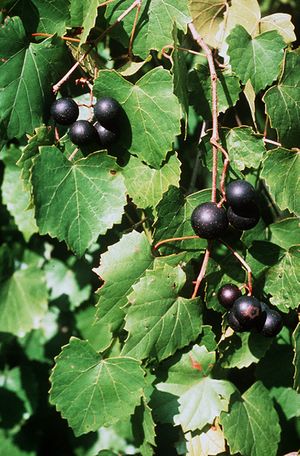Muscadine
Muscadines (Vitis rotundifolia) are a grapevine species native to the present-day southeastern United States that has been extensively cultivated since the 16th Century. Its recognized range in the United States extends from New York south to Florida, and west to Missouri, Kansas, Arkansas, Oklahoma and Texas. They are well adapted to their native warm and humid climate; they need fewer chilling hours than better known varieties and they thrive on summer heat.
Muscadine berries range from bronze to dark purple to black in color when ripe. However, many wild varieties stay green through maturity. They have skin sufficiently tough that eating the raw fruit often involves biting a small hole in the skin to suck out the pulp inside. Muscadines are not only eaten fresh, but also are used in making wine, juice, and jelly.
Muscadine grapes are rich sources of polyphenols and other nutrients studied for their potential health benefits. Reports have indicated that muscadine grapes may contain high concentrations of resveratrol – a polyphenol with reported beneficial health effects — and that wines produced from these grapes, both red and white, may contain more than 40 mg/L of resveratrol. However, subsequent studies have found no or little resveratrol in different varieties of muscadine grapes.
In a natural setting, muscadines are important plants for improving wildlife habitat by providing cover, browse, and fruit for a wide variety of animals
Vitis rotundifolia
Other nutrients
A Mississippi State University nutritionist reported that a purée of muscadine skins and pulp is an excellent source also of dietary fiber, essential minerals and carbohydrates and is low in fat. Muscadine purée powder has more dietary fiber than oat or rice bran.
Anti-cancer evidence
As one of nature's richest sources of polyphenolic antioxidants, muscadines have been studied for their potential health benefits which include preliminary evidence for effects against cancer mechanisms. To date, in vitro studies have shown positive effects of muscadine phenolics against blood, colon and prostate cancers.
